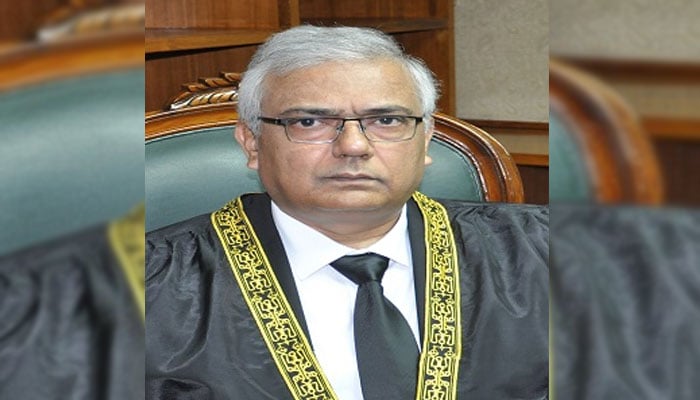Justice Aminuddin: a profile
Justice Amin-ud-Din Khan was elevated to the Supreme Court of Pakistan on October 21, 2019
KARACHI: With Justice Amin-ud-Din Khan at the helm of the newly-formed seven-member constitutional bench, here is a look at his judicial career. Born on December 1, 1960, in Multan, Justice Amin-ud-Din Khan comes from a respected legal lineage -- the grandson of Khan Sadiq Muhammad Ahsan, a prominent lawyer of his time.
Justice Khan’s early education began at Kinder Garten Muslim School and Government Muslim High School in Multan, from where he graduated in 1977. His academic journey in law was built on a foundation in philosophy, earning a Bachelor’s degree in 1981 before completing his LLB at University Law College, Multan, in 1984, alongside a diploma in Taxation Law.
Justice Amin-ud-Din Khan’s legal career began under the mentorship of his father, as he obtained his law licence in the lower courts in 1985. In 1987, he enrolled as an advocate of the Lahore High Court and, by 2001, as an advocate of the Supreme Court. He honed his legal expertise at Zafar Law Chambers in Multan, where he specialised in civil law with a particular focus on complex property disputes, pre-emption rights, and inheritance matters -- earning a strong reputation through high-profile cases before the Supreme Court.
In 2011, Justice Khan was appointed to the Lahore High Court bench, where he soon became noted for resolving long-standing civil cases efficiently. Presiding over cases at the Bahawalpur, Multan, and Lahore benches, he contributed a series of judgments that were frequently upheld by the Supreme Court.
Justice Amin-ud-Din Khan was elevated to the Supreme Court of Pakistan on October 21, 2019. Notable among Justice Khan’s recent judgments is his dissenting note in the July 12 reserved seats verdict. Justice Khan was also part of the nine-member larger bench that reviewed the presidential reference filed against the hanging of former prime minister Zulfikar Ali Bhutto.
He has also made substantial contributions to legal education, serving as an examiner and lecturer at University Law College, Multan. Additionally, he has held roles on the Syndicate of several universities, including the University of Engineering and Technology, Lahore.
-
 Bridgerton’s Michelle Mao On Facing Backlash As Season Four Antagonist
Bridgerton’s Michelle Mao On Facing Backlash As Season Four Antagonist -
 King Charles Gets New ‘secret Weapon’ After Andrew Messes Up
King Charles Gets New ‘secret Weapon’ After Andrew Messes Up -
 Shia LaBeouf Makes Bold Claim About Homosexuals In First Interview After Mardi Gras Arrest
Shia LaBeouf Makes Bold Claim About Homosexuals In First Interview After Mardi Gras Arrest -
 Princess Beatrice, Eugenie ‘strained’ As They Are ‘not Turning Back’ On Andrew
Princess Beatrice, Eugenie ‘strained’ As They Are ‘not Turning Back’ On Andrew -
 Benny Blanco Addresses ‘dirty Feet’ Backlash After Podcast Moment Sparks Online Frenzy
Benny Blanco Addresses ‘dirty Feet’ Backlash After Podcast Moment Sparks Online Frenzy -
 Sarah Ferguson Unusual Trait That Confused Royal Expert
Sarah Ferguson Unusual Trait That Confused Royal Expert -
 Prince William, Kate Middleton Left Sarah Ferguson Feeling 'worthless'
Prince William, Kate Middleton Left Sarah Ferguson Feeling 'worthless' -
 Ben Affleck Focused On 'real Prize,' Stability After Jennifer Garner Speaks About Co Parenting Mechanics
Ben Affleck Focused On 'real Prize,' Stability After Jennifer Garner Speaks About Co Parenting Mechanics -
 Luke Grimes Reveals Hilarious Reason His Baby Can't Stop Laughing At Him
Luke Grimes Reveals Hilarious Reason His Baby Can't Stop Laughing At Him -
 Why Kate Middleton, Prince William Opt For ‘show Stopping Style’
Why Kate Middleton, Prince William Opt For ‘show Stopping Style’ -
 Here's Why Leonardo DiCaprio Will Not Attend This Year's 'Actors Award' Despite Major Nomination
Here's Why Leonardo DiCaprio Will Not Attend This Year's 'Actors Award' Despite Major Nomination -
 Ethan Hawke Reflects On Hollywood Success As Fifth Oscar Nomination Arrives
Ethan Hawke Reflects On Hollywood Success As Fifth Oscar Nomination Arrives -
 Tom Cruise Feeling Down In The Dumps Post A Series Of Failed Romances: Report
Tom Cruise Feeling Down In The Dumps Post A Series Of Failed Romances: Report -
 'The Pitt' Producer Reveals Why He Was Nervous For The New Ep Of Season Two
'The Pitt' Producer Reveals Why He Was Nervous For The New Ep Of Season Two -
 Maggie Gyllenhaal Gets Honest About Being Jealous Of Jake Gyllenhaal
Maggie Gyllenhaal Gets Honest About Being Jealous Of Jake Gyllenhaal -
 'Bridgerton' Star Luke Thompson Gets Honest About Season Five
'Bridgerton' Star Luke Thompson Gets Honest About Season Five




